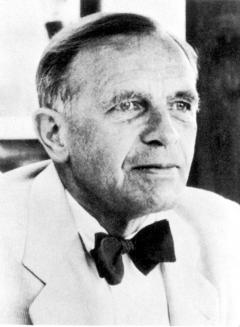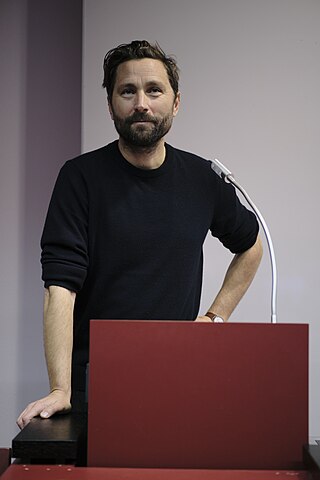Philip Mirowski (born 21 August 1951 in Jackson, Michigan) is a historian and philosopher of economic thought at the University of Notre Dame. He received a PhD in Economics from the University of Michigan in 1979. [1]
Philip Mirowski (born 21 August 1951 in Jackson, Michigan) is a historian and philosopher of economic thought at the University of Notre Dame. He received a PhD in Economics from the University of Michigan in 1979. [1]
In his 1989 book More Heat than Light, Mirowski reveals a history of how physics has drawn inspiration from economics and how economics has sought to emulate physics, especially with regard to the theory of value. He traces the development of the energy concept in Western physics and its subsequent effect on the invention and promulgation of neoclassical economics, the modern orthodox theory. Mirowski's thesis has been challenged by Hal Varian and defended, with some reservations, by D. Wade Hands. [2]
Machine Dreams explores the historical influences of the military and the cyborg sciences on neoclassical economics. The neglected influence of John von Neumann and his theory of automata are key themes throughout the book. Mirowski claims that many of the developments in neoclassical economics in the 20th century, from game theory to computational economics, are the unacknowledged result of von Neumann's plans for economics. The work expands Mirowski's vision for a computational economics, one in which various market types are constructed in a similar fashion to Noam Chomsky's generative grammar. The role of economics is to explore how various market types perform in measures of complexity and efficiency, with more complicated markets being able to incorporate the effects of the less complex. By complexity Mirowski means something analogous to computational complexity theory in computer science.[ citation needed ] Mirowski's criticism of game theory is noted by financial economist and historian Peter L. Bernstein. [3]
In his book Never Let a Serious Crisis Go to Waste, Mirowski concludes that neoliberal thought has become so pervasive that any countervailing evidence serves only to further convince disciples of its ultimate truth. Once neoliberalism became a Theory of Everything, providing a revolutionary account of self, knowledge, information, markets, and government, it could no longer be falsified by anything as trifling as data from the "real" economy.[ citation needed ]
Neoclassical economics is an approach to economics in which the production, consumption, and valuation (pricing) of goods and services are observed as driven by the supply and demand model. According to this line of thought, the value of a good or service is determined through a hypothetical maximization of utility by income-constrained individuals and of profits by firms facing production costs and employing available information and factors of production. This approach has often been justified by appealing to rational choice theory.

A market economy is an economic system in which the decisions regarding investment, production and distribution to the consumers are guided by the price signals created by the forces of supply and demand. The major characteristic of a market economy is the existence of factor markets that play a dominant role in the allocation of capital and the factors of production.
Neoliberalism, also neo-liberalism, is a term used to signify the late-20th century political reappearance of 19th-century ideas associated with free-market capitalism. The term has multiple, competing definitions, and is often used pejoratively. In scholarly use, the term is frequently undefined or used to characterize a vast variety of phenomena, but is primarily used to describe the transformation of society due to market-based reforms.

Law and economics, or economic analysis of law, is the application of microeconomic theory to the analysis of law. The field emerged in the United States during the early 1960s, primarily from the work of scholars from the Chicago school of economics such as Aaron Director, George Stigler, and Ronald Coase. The field uses economics concepts to explain the effects of laws, to assess which legal rules are economically efficient, and to predict which legal rules will be promulgated. There are two major branches of law and economics; one based on the application of the methods and theories of neoclassical economics to the positive and normative analysis of the law, and a second branch which focuses on an institutional analysis of law and legal institutions, with a broader focus on economic, political, and social outcomes, and overlapping with analyses of the institutions of politics and governance.
The Mont Pelerin Society (MPS), founded in 1947, is an international organization of economists, philosophers, historians, intellectuals and business leaders. It has been described as neoliberal in its ideological orientation, though some scholars claim that it is classically liberal. It is headquartered at Texas Tech University in Lubbock, Texas. The society advocates freedom of expression, free market economic policies and the political values of an open society. Further, the society seeks to discover ways in which the private sector can replace many functions currently provided by government entities.

An economic model is a theoretical construct representing economic processes by a set of variables and a set of logical and/or quantitative relationships between them. The economic model is a simplified, often mathematical, framework designed to illustrate complex processes. Frequently, economic models posit structural parameters. A model may have various exogenous variables, and those variables may change to create various responses by economic variables. Methodological uses of models include investigation, theorizing, and fitting theories to the world.
Econophysics is a non-orthodox interdisciplinary research field, applying theories and methods originally developed by physicists in order to solve problems in economics, usually those including uncertainty or stochastic processes and nonlinear dynamics. Some of its application to the study of financial markets has also been termed statistical finance referring to its roots in statistical physics. Econophysics is closely related to social physics.

Wilhelm Röpke was a German economist and social critic, best known as one of the spiritual fathers of the social market economy. A Professor of Economics, first in Jena, then in Graz, Marburg, Istanbul, and finally Geneva, Röpke theorised and collaborated to organise the post-World War II economic re-awakening of the war-wrecked German economy, deploying a program referred to as ordoliberalism, a more conservative variant of German liberalism.
Ordoliberalism is the German variant of economic liberalism that emphasizes the need for government to ensure that the free market produces results close to its theoretical potential but does not advocate for a welfare state.

The Foundation for Economic Education (FEE) is an American conservative, libertarian economic think tank. Founded in 1946 in New York City, FEE is now headquartered in Atlanta, Georgia. It is a member of the State Policy Network.
Eliot Roy Weintraub is an American mathematician, economist, and, since 1976, professor of economics at Duke University. He was born in 1943 in New York City.

Heterodox economics is any economic thought or theory that contrasts with orthodox schools of economic thought, or that may be beyond neoclassical economics. These include institutional, evolutionary, feminist, social, post-Keynesian, ecological, Austrian, humanistic, complexity, Marxian, socialist, anarchist and modern monetary theory economics.
Gottfried von Haberler was an Austrian-American economist. He worked in particular on international trade. One of his major contributions was reformulating the Ricardian idea of comparative advantage in a neoclassical framework, abandoning the labor theory of value for an opportunity cost concept.
Complexity economics is the application of complexity science to the problems of economics. It relaxes several common assumptions in economics, including general equilibrium theory. While it does not reject the existence of an equilibrium, it sees such equilibria as "a special case of nonequilibrium", and as an emergent property resulting from complex interactions between economic agents. The complexity science approach has also been applied to computational economics.
David Miles Bensusan-Butt was an English economist who spent much of his career in Australia. Known as David, he published his work as D. M. Bensusan-Butt.
Mathematical economics is the application of mathematical methods to represent theories and analyze problems in economics. Often, these applied methods are beyond simple geometry, and may include differential and integral calculus, difference and differential equations, matrix algebra, mathematical programming, or other computational methods. Proponents of this approach claim that it allows the formulation of theoretical relationships with rigor, generality, and simplicity.

Anwar M. Shaikh is a Pakistani American heterodox economist in the tradition of classical political economy and Marxian economics.

Floyd Arthur "Baldy" Harper was an American academic, economist and writer who was best known for founding the Institute for Humane Studies in 1961.
Alain A. Lewis is an American mathematician. A student of the mathematical economist Kenneth Arrow, Lewis is credited by the historian of economics Philip Mirowski with making Arrow aware of computational limits to economic agency.

Quinn Slobodian is a Canadian historian of modern Germany and international history who has been Marion Butler McLean Professor of the History of Ideas at Wellesley College since 2022. Beginning in January 2024, he will be Professor of History at Boston University. During 2017-2018 academic year, he was a Residential Fellow at the Weatherhead Center for International Affairs, Harvard University.